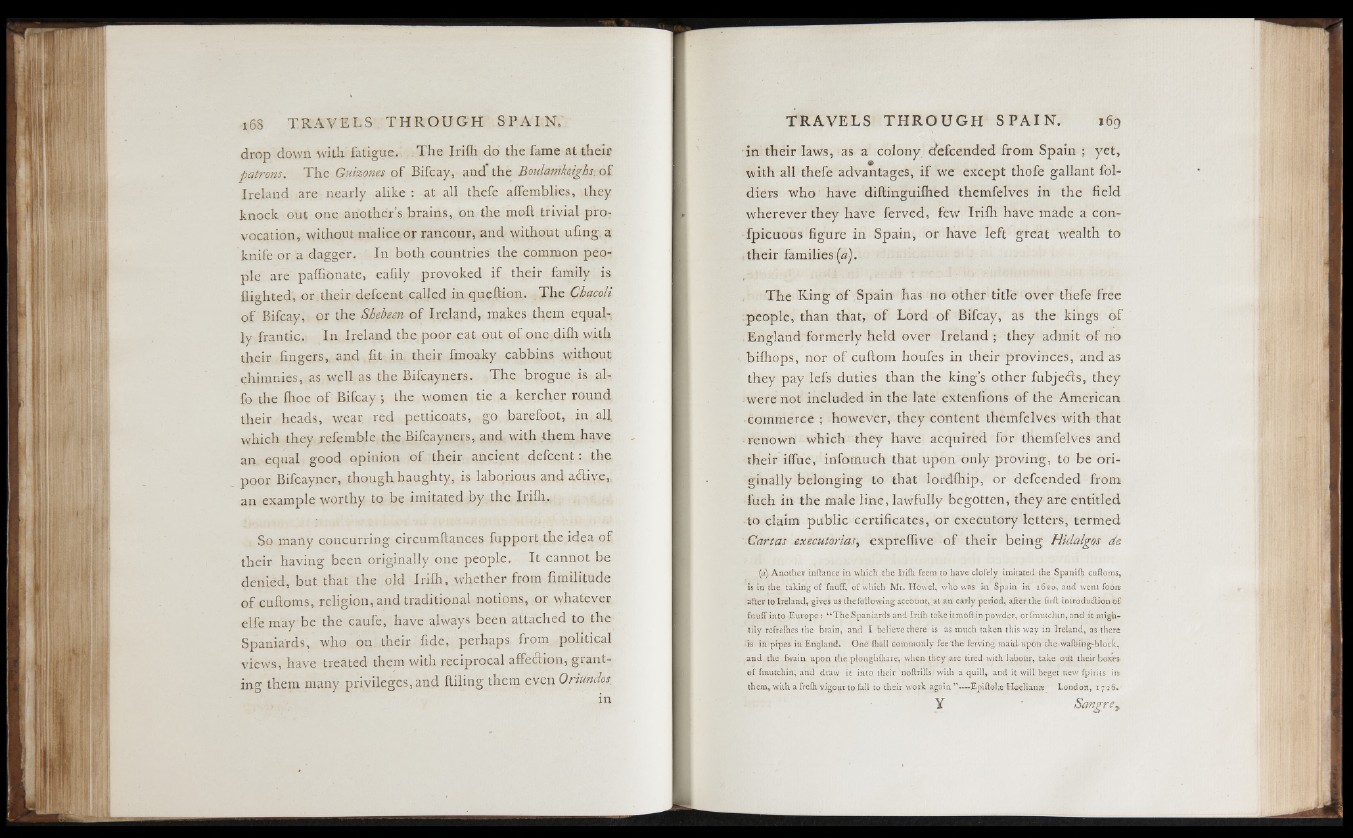
drop down with fatigue. The Iriih do the fame at their
patrons. The Guizones of Bifcay, and the Boulamfoighs. of
Ireland are nearly alike : at all thefe alfemblies, they
knock out one another’s brains, on the molt trivial provocation,
without malice or rancour, and without uiing. a
knife or a dagger. In both countries the common people
are paffionate, eafily provoked if their family is
flighted, or their defcent called in queftion. .The Chacoli
o f Bifcay, or the Shebeen o f Ireland, makes them equal-,
ly frantic. In Ireland the poor eat out of one difh with
their fingers, and fit in their fmoaky cabbins without
chimnies, as well as the Bifcayners. The brogue is al-
fo the fhoe of Bifcay; the women tie a kercher round
their heads, wear red petticoats, go barefoot, in. all,
which they refemble the Bifcayners, and with them have
an equal good opinion of their ancient defcent: the
poor Bifcayner, though haughty, is laborious and adive,.
an example worthy to be imitated by the Iriih.
So many concurring circumftances fupport the idea of
their having been originally one people. It cannot be
denied, but that the old Iriih, whether from fimilitude
of cuftoms, religion, and traditional notions, or \yhatever
elfe may be the caufe, have always been attached to the
Spaniards, who on their fide, perhaps from political
views, have treated them with reciprocal affedion, granting
them many privileges,and filling them even Oriundos.
in their laws, as a colony cfefcended from Spain ; yet,
9 . ■»
with all thefe advantages, i f we except thofe gallant fol-
diers who have diftinguifhed themfelves in the field
wherever they have ferved, few Iriih have made a con-
fpicuous figure in Spain, or have left great wealth to
their families [a).
The K-ing of Spain has no other title over thefe free
people, than that, of Lord of Bifcay, as the kings o f
England formerly held over Ireland; they admit of no
bifhops, nor of cuftom houfes in their provinces, and as
they pay lefs duties than the king’s other fubjeds, they
were not included in the late extenfions of the American
■commerce | however, they content themfelves with that
renown which they have acquired for themfelves and
their iifue, infomuch that upon only proving, to be originally
belonging to that lordfhip, or defcended from
fuch in the male line, lawfully begotten, they are entitled
to claim public certificates, or executory letters, termed
Cartas executarias, expreffive of their being Hidalgos d&
(h) Another inftance in which the Iriih feem to have clofely imitated the Spanifb cuiloms,
is in the taking'of fnuff, of which Mr. Howel, who was in Spain in 1620, and went fooru
after to Ireland,, gives us the following account, .at an early period, after the firft introduction ©f
fnuff into Europe: “ The Spaniards and Iriih take it moil in powder,. orfmutcliin,.and it mightily
refrefhes the brain, and I believe there is as much taken this way in Ireland, as there
-is in pipes in England. One iliall commonly fee the ferving maid* upon the wafi>ingrblock,
■and the twain upon the ploughfhare, when .they are tired with labour, take out their boxes-
of fmutchirt, and draw it into their noftrills, with a quill,, and it will beget new fpirks in;
them, with a freih vigour to fall to their work again ”— Epifinite. Hoeliame London, 17 2 6.-
Y SangrSy.